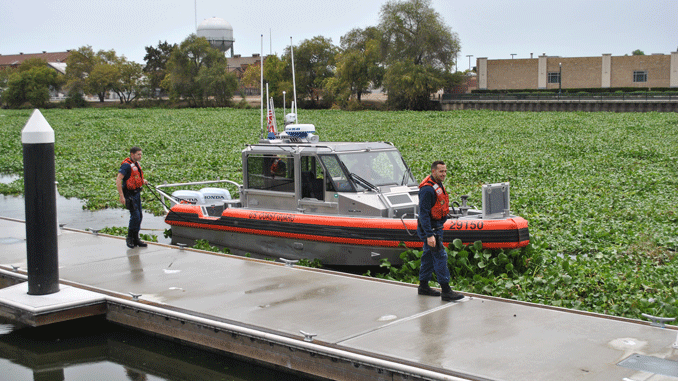
The Delta is a recreational wonderland, providing the community with opportunities to get on the water and explore through water skiing, jet skiing, wakeboarding, house boating, fishing, and more. It’s also an expansive waterway system that provides water supply for millions of Californians and millions of acres of farmland. Because of this, the Delta is an important part of our local ecosystem, affecting the water we drink and the food we consume. It’s also an important source of income for the economy—the boating industry in the Delta is estimated at $750 million. To keep the Delta clean, to keep ourselves healthy, and to keep our local businesses thriving, local heroes are championing for water clean-up efforts, effective water testing, boat removal, and more. “It is amazing what can get done when we all work together,” says Tracie Glaves, founder of the San Joaquin Delta Neighborhood Watch.
One of the biggest issues facing the Delta—the Delta is the switching yard for California’s water system and the rivers flowing into it, primarily the Sacramento River and San Joaquin River, but also the Calaveras, Mokelumne and Cosumnes Rivers— is the trash accumulating in the waterways. Locals as well as local government entities have taken it upon themselves to keep the Delta clean, protecting the crops coming out of San Joaquin and Yolo counties as well as the people who get into the water.
“On the Smith Canal we removed 300 grocery carts,” Tracie says. To this day, it is still one of the craziest clean-up efforts Bill Wells, president of the California Delta Chambers & Visitor’s Bureau, says he’s seen to date. The carts were completely submerged underwater, which isn’t uncommon for much of the debris found in the Delta including full-sized cars and boats. “Trash that is dumped in the Delta sinks to the bottom and continues to pollute our waterways for years,” Blair Hake, director and past president of the California Delta Chambers & Visitor’s Bureau, says.
On one day, the San Joaquin Delta Neighborhood Watch volunteers, Stockton Police Department, and San Joaquin County public works, and San Joaquin County Sheriff removed 32 tons of garbage from waterways and levees. “This is the first time a joint effort of the type was done in SJC,” Tracie says.
Eric Vink, a member of The Delta Protection Commission (a State agency committed to the protection and health of the Delta), says the strangest item he ever saw pulled from the Delta was a video game console, which, when you think about it, it is weird to imagine how it got there.
“The DPC protects, maintains, enhances and enriches the overall quality of the Delta environment and economy,” Eric says. “DPC does this with a focus on agriculture, recreation, and natural resources, while remaining mindful of the importance of the Delta to all Californians.” As part of that work, commission staff like Eric participate in the annual California Coastal Cleanup day in September. Eric has worked as a captain during the event at the cleanup sites in the City of West Sacramento for the past five years. The event also includes a large cleanup effort at Buckley Cove in Stockton.
When trash builds up in the Delta, it not only affects the safety of the waterways for people utilizing the Delta for recreational activities, it also affects water flow and the quality of the water. And the effects go beyond the Delta. “What doesn’t get pulled out of Delta waterways and shorelines will make its way out to San Francisco Bay,” Eric explains. That’s just one more reason local groups are becoming more diligent about cleaning up the Delta and protecting water throughout the state of California.
The SJC Delta Neighborhood Watch group calls for people to care for the Delta, asking local community to give issues related to the environment, safety, and crime the importance they deserve through individual efforts, group clean-up events, education, and voting. After all, the Delta is the heart of this community, affecting people, fish, recreational users, and Delta farms. “The Delta needs heroes to step up and show that we care,” Tracie says. “If we don’t show we care, how can we expect people in charge to care? We have all used and enjoyed the Delta, it is time for us to give back and ensure the Delta, as we have known it, will be here for years to come.”
Bill says that the solution to the Delta’s issues rest with the people. After all, we are the ones polluting the waterways with garbage. He, however, also acknowledges the importance of government on this issue. Most of the pollution, according to Bill, could have been prevented by more involvement by the government at all levels,” he says. The problem? Not everyone appreciates the Delta. “Local governments frequently don’t realize what a treasure the waterways are, and the state and federal government mainly look at the Delta as a water fixture,” he says. And even with more than $66 million attributed to local agencies charged with protecting, conserving, and stewarding the Delta, it isn’t enough. The coveted water is still facing immense amounts of pollution, poor water quality, and bureaucratic issues that threaten its ability to continue to serve San Joaquin County.
One of the bigger problems that many involved in the Delta clean-up efforts note is the sudden uptick in vagrants and homeless calling the banks of the Delta home. But Tracie points out that it isn’t their presence that is causing the issue, it’s the behavior of treating the Delta like a sewer and a garbage dump. As a result, Tracie has seen human waste, hypodermic needles, and other trash, polluting the waterways near camps. “No one group or person has the right to jeopardize anyone’s health, safety, and welfare,” Tracie says. “How can you not smoke within 20 feet of a public door to protect our health, safety and welfare, but you can dump raw sewage and garbage directly in our main source of drinking waterway?”
Bill and Tracie agree, the answer is better policing of the homeless and vagrant population on the waterways, holding individuals accountable for their illegal actions. “The Delta is literally the heart of California; it supports populations of important game fish as well as other wildlife and supplies fresh water to millions of California residents. It is crucial that we keep this eco-system viable,” Bill says.
Water Quality
In addition to the negative effects of trash on safety in the Delta, it is also having a poor impact on water quality. This is the water we use to grow crops on local farms and swim in on family vacations, but the water is less than clean. “[The] California Regional Valley Water Board did 20 weeks of E. coli testing and proof is in the results,” Tracie says. “We have a problem.”
So, what are the potential negative effects of the water quality issues? Well many people, for one, do not realize that the Delta provides drinking water for many citizens in the area, so if that water isn’t clean, polluted by trash and bacteria, it’s negatively affecting public health. Monetarily, the Port of Stockton has an annual revenue of around $69 million and 125 employees that greatly rely on the recreation and tourism dollars coming in from the Delta. If the Delta becomes deemed unsafe for use, those dollars will experience a decline after fishing tournaments are pulled due to environmental concerns, jobs will be lost due to fewer boats, local businesses will become less lucrative as visits decline, and local programs like the Stockton Sailing program for Children will be canceled due to unsafe algae bloom and E. coli levels. Not to mention, the people of San Joaquin County have a right to clean drinking water and fish living in the Delta that are safe to eat. It all boils down to the health, safety, and welfare of San Joaquin County residents, residents in neighboring counties, and the state of California as a whole.
Nicky Sward, owner of Snug Harbor and Delta Heart Beat Tours, takes it upon herself to test the water levels and report them. She has a kit used to determine bacteria and other uncleanly particles affecting the waterways and when she gets a concerning reading, she sends the information off to officials for a proper check. She also gives tours to locals in the community and will point out the mounds of trash and abandoned boats polluting the water, spreading awareness to community members who don’t want to turn a blind eye.
Because the Delta is connected to the ocean through the San Francisco Bay, there is another water quality issue facing the waterways; “Everybody is so concerned about salt water encroachment,” Nicky says. That’s because the appearance of saltwater in the freshwater waterways can destroy crops that not only San Joaquin County but the rest of California depends on. A rock barrier was built at Frank’s Tract at False River by the Department of Water Resources, but it isn’t effective enough according to Nicky who tests saltwater levels using a portable salinity testing unit at 30 feet below the surface. Saltwater on the surface may read different levels, but farmers are pulling from the bottom of the waterways so the presence of saltwater at 30 feet below is significant. Not to mention that saltwater also affects the drinking water many residents rely on, and, according to Nicky’s test, water quality is getting worse with reported presence of arsenic, manganese, and boron in the water.
Get Involved
One of Tracie’s biggest calls to duty is asking other community members to join her in her efforts to protect the Delta through the Neighborhood Watch program and organized clean-up days that rely on volunteers to get results. “When you stand up, show up, and speak up, you will start to see change happen and our group is proof of that,” Tracie says.
The best way to volunteer is to show up for one of the community’s various clean-up days. In addition to the September date hosted by the DPC, both the Delta neighborhood watch community and the visitor’s bureau post information about upcoming efforts of their Facebook pages.
The other way to support community efforts related to Delta health and safety is to be a diligent member of the community. Report illegal activity or known dumping grounds to authorities and let officers know when you see campsites on the banks engaging in illegal activity. Being a steward of the community sometimes means being a whistle blower, and if the law enforcement agencies are not aware of the issues, there can’t enforce the rules.

